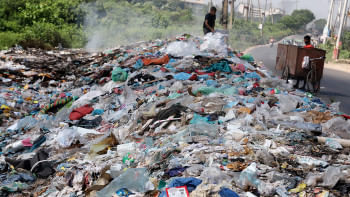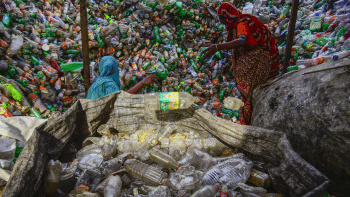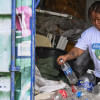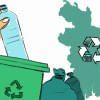How plastic waste can drive the economy forward

So, what happens when you discard a used plastic bottle in a bin? The journey is nothing short of a Jules Verne adventure novel.
The discarded, or in technical terms "post-consumed," PET bottle is collected by the waste workers doing duty for local waste collection contractors, under the umbrella of the city corporations.
It then goes in the waste van and after that to a collection spot. From there, the bottle, along with other recyclables, is sorted out for the second phase of the journey to the recycling destination. It reaches a scrap dealer and then a PET collector, who removes the caps and labels and washes and bales the bottle to be delivered to the recycler.
At the recycler's facility, the bottle goes through multiple washing, cleaning, reforming processes, and is then turned into clean flakes. Then begins the final journey. If these flakes are meant for export, they are packed and shipped off to new destinations, such as Vietnam, Indonesia, India, Russia and even China. If they are to be circulated back into the local economy, these flakes are turned into polyester yarn and fabric, among other substances, as raw material for the RMG sector, or into 100 percent food grade recycled resin, used for making new PET bottles. So, a used plastic bottle can re-emerge as a new one through recycling, support the growing RMG sector, or make a new life for itself in a foreign land.
But only less than half of the plastic waste generated in Dhaka is recycled. In the 2021 World bank report, titled "Towards a Multisectoral Action Plan for Sustainable Plastic Management in Bangladesh," the number stood at only 37.2 percent.
One of the key challenges is that the country's waste management system is still highly informal, with cheap labour being exploited by the local thikadars or contractors, who get the mandate from city corporations to collect waste from households, organisations and other touchpoints for various localities. On top of the workers not being trained on waste segregation or waste evaluation, they are also not empowered with knowledge on how they can earn extra by selling the recyclables to scrap dealers.
Not that the plastic recycling industry is lagging behind in capacity. According to media reports, there are more than 300 plastic recycling factories in Bangladesh, which make the much-in-demand plastic flakes. Around 40,000 tonnes of recycled flakes are exported every year by 80 of these facilities.
To utilise the existing capacity of the plastic recycling industry, there is a need for about 200,000 tonnes of plastic scrap, against a supply of 70,000 tonnes, sourced both locally and through imports. As a result, not only are the recyclers struggling, but as an economy, we are not able to turn plastic pollution into a lever for growth.
While the problem and opportunities have been identified, we need to find solutions to make sure plastic does not end up in landfills, and are rather turned into a source of export income for us. Looking at the data might give a clearer picture of the economic opportunities. If we look at Dhaka alone, the capital's annual per capita plastic consumption stands at 22.25 kg. Every day, about 646 tonnes of plastic waste is collected in the city, around 10 percent of all waste generated across the country. Unfortunately, as mentioned earlier, only about one-third of this plastic waste is recycled. Apart from this, about 48 percent of this waste is dumped in landfill, 12 percent goes into the rivers and canals, and three percent ends up in drains and other unserved areas of the two city corporations. According to the World Bank report, "An estimated 24,032-36,047 tons of plastic waste are disposed of per year in 1,212 hot spots around khals and rivers, all of which are connected to the river system."
Moving on to solutions: there are multiple factors that we need to look at to come up with a comprehensive approach to turn plastic waste into an income source.
The first piece of the puzzle is ensuring an effective waste disposal mechanism. We have seen cities across the country going underwater, even in the face of moderate rain, and one of the major reasons identified is plastic waste clogging the drains. This is because we do not have sufficient waste disposal facilities and adequate arrangements for segregated waste management. As a result, even with the right intentions, people cannot dispose of waste responsibly.
In public places, except for hospitals perhaps, segregated bins are hard to find. Even in hospitals, the practice is to ensure safe disposal of medical waste. At home, even if we segregate waste into organic, general, recyclable, and hazardous categories and keep them in separate buckets, during collection by waste workers, everything is dumped together in the same van.
Moreover, the majority of people are not even aware of the different segregations of waste, and how each should be disposed of, or more importantly, where. As a result, valuable recyclables often end up in landfills, instead of recycling facilities. Apart from lack of public trash bins and awareness on waste disposal, a lack of penalty for environmental pollution through littering also encourages such acts.
However, beyond the basics, one of the key challenges is that the country's waste management system is still highly informal, with cheap labour being exploited by the local thikadars or contractors, who get the mandate from city corporations to collect waste from households, organisations and other touchpoints for various localities. On top of the workers not being trained on waste segregation or waste evaluation, they are also not empowered with knowledge on how they can earn extra by selling the recyclables to scrap dealers. There is also a red flag in this sector: the persistent and rampant exploitation of child labour. Tokai or rag pickers, as we call them, range from toddlers to teenagers and are provided with a paltry payment for their labour-intensive task. This should be rectified immediately, with social welfare authorities ensuring that these kids go to school.
Apart from these, there seems to be a lack of ownership by the city corporations in the entire waste management ecosystem. The policymakers have formulated sound policies, such as the Solid Waste Management Rules 2021 and the National 3R (Reduce, Reuse and Recycle) Strategy, based on which the Extended Producer Responsibility is also in the pipeline. However, these policies are only as good as their implementation. If the waste collection and disposal mechanisms are not in line with these policies, they will be rendered ineffective, just like the 2002 ban on polythene bags.
It is high time the policymakers, Ministry of Environment, Forest and Climate Change, Department of Environment, and the city corporations acknowledged their responsibility, took stock of the situation and worked in tandem to formulate, implement, and enforce effective policies on plastic waste management.
Towards this endeavour, waste workers should be trained on waste evaluation and segregation and should be connected to the extended recycling value chain so that they can play their role in driving a circular economy on plastic, while improving their own livelihood.
The government has a target to reduce plastic waste by 30 percent by 2030. To support export of recycled flakes and polyester staple fibre, the government is also providing a 10 percent subsidy. Along with the good initiatives are piecemeal ones as well. What we need to do now is strengthen the recycling industry and streamline the waste management system, so that as a nation we can turn the plastic pollution problem into an opportunity for economic growth.
Tasneem Tayeb is a columnist for The Daily Star. Her X handle is @tasneem_tayeb
Views expressed in this article are the author's own.
Follow The Daily Star Opinion on Facebook for the latest opinions, commentaries and analyses by experts and professionals. To contribute your article or letter to The Daily Star Opinion, see our guidelines for submission.

 For all latest news, follow The Daily Star's Google News channel.
For all latest news, follow The Daily Star's Google News channel. 












Comments